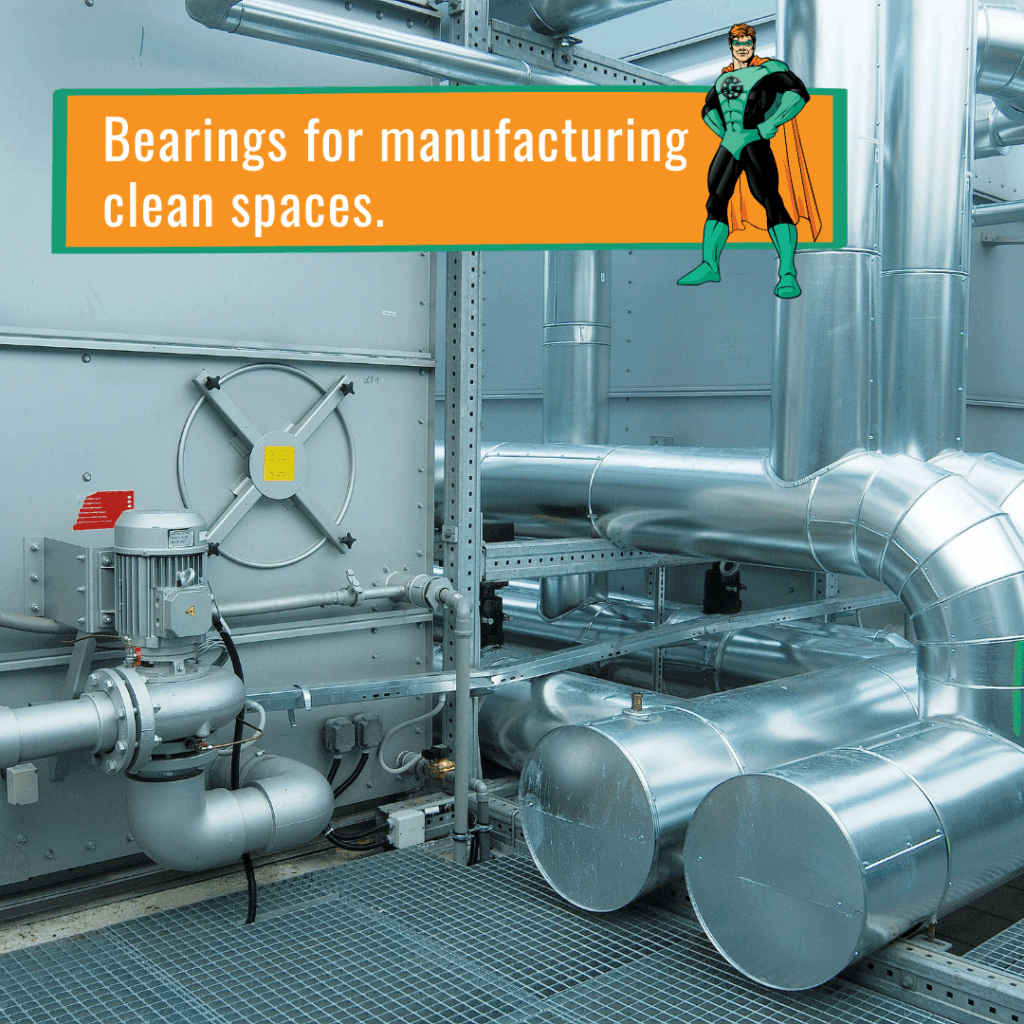
How Do You Choose the Right Bearings for a Cleanroom?
Cleanroom bearings demand careful consideration. Cleanrooms are no place for guesswork. Whether you’re bottling baby formula or assembling microchips, one rogue particle can cost more than downtime.
Your cleanroom bearings matter. Get them wrong, and it’s not just the kit that fails — it’s your audit, your hygiene score, and possibly your product integrity. Bearings here don’t just keep things moving. They keep contamination out. And that makes them critical.
What Makes a cleanroom Bearing different?
A cleanroom bearing isn’t just a shiny bearing in a shiny room. It’s designed to keep contaminants out and your audit trail squeaky clean.
Look for:
- Low particle emission under load
- Grease that stays put and doesn’t gas off
- Sealed units that don’t leak or suck in debris
- Corrosion-resistant materials that don’t flake or pit
Not all cleanrooms are dry. Wet-process cleanrooms — common in high-care food, dairy, and biotech — combine strict air quality with constant washdowns. Bearings here must survive both water ingress and airborne particle limits.
In food processing, these are often called washdown areas or high-hygiene zones. They demand:
- IP66/IP69K sealing
- Corrosion-resistant housings (polymer or stainless)
- Self-draining designs to avoid standing water
For more detail on wet cleanroom bearing design, see our Guide to Bearings in Food Production.
What Are the Different Types of Cleanroom bearings?
Depending on the type of cleanroom you’re working in, changes everything about your bearing spec.
Dry Cleanrooms
- Found in microelectronics, aerospace, and medical device manufacturing.
- Air is temperature and humidity controlled, with strict particle limits.
- Bearings here focus on low particle emission and low outgassing lubricants.
- Corrosion is rarely the main concern — particle control is.
Wet-Process Cleanrooms
- Common in high-care food production, dairy, beverage, and biotech.
- Combine particle control with constant washdowns and high humidity.
- Bearings must survive both airborne cleanliness requirements and water/chemical ingress.
- IP66/IP69K seals, stainless/polymer housings, and self-draining designs are essential.
Hybrid Environments
- Some facilities move products between dry and wet zones.
- Bearings in these transfer areas need multi-environment resilience — sealed, corrosion-resistant, and still cleanroom-certified.
Which Bearings Work Best in Dry Cleanrooms?
Dry cleanrooms are common in microelectronics, aerospace, and medical device manufacturing. Here, particle control is everything — moisture and corrosion are rarely the main threats.
Recommended spec:
- Ceramic or hybrid bearings – low particle emission, minimal wear debris.
- Low-outgassing lubricants – prevent vapour contamination in controlled air.
- Precision sealing – non-contact seals or shields to reduce drag and particle generation.
- High-tolerance grades – ABEC/ISO Class 5 or higher for minimal vibration.
Avoid:
- Greases not tested for low vapour pressure.
- Contact seals that increase friction and heat.
- Any material prone to flaking or corrosion under temperature variation.
Dry cleanroom bearings are about precision, low contamination, and stability — not brute strength.
Which cleanroom Bearings Work Best in Wet-Processing areas?
Wet-process cleanrooms are found in high-care food production, dairy, beverage, and biotech. They combine particle limits with constant washdowns, high humidity, and aggressive cleaning chemicals.
Recommended spec:
- Stainless steel or polymer housings – corrosion-resistant and easy to clean
- IP66/IP69K sealing – stops water and chemicals entering the bearing
- Self-draining design – prevents water pooling around housings.
- NSF H1 grease – safe for incidental product contact.
- Auto-lubrication systems – reduce manual intervention and ingress risk.
Avoid:
- Mild steel housings (rusts quickly).
- Bearings without documented ingress protection.
- Lubricants not compatible with cleaning chemicals.
Wet cleanroom bearings are about hygiene, ingress protection, and audit compliance.
How Should You Handle Lubrication in a Cleanroom?
Lubrication is often where cleanroom bearing specs fail.
You need:
- NSF H1 grease – safe for incidental contact with food or pharma products
- Low-vapour options – prevent air contamination
- Perma auto-lubricators – reduce handling and ingress risk
In wet cleanrooms, sealing is non-negotiable. IP66/IP69K bearings resist both water and chemical ingress. Choose lubricants compatible with your cleaning regime. Auto-lube systems also cut manual intervention, lowering contamination risk.
For washdown-specific lubrication tips, read our Guide to Bearings for Manufacturing Environments.
What Are the Most Common Cleanroom Bearing Mistakes?
We’ve seen:
- Bearings specced for forklifts in pharma zones
- Assuming “stainless” means sterile
- Over-lubing until grease purges onto product surfaces
- Using open bearings (instant audit fail)
- Installing dry-rated bearings in wet cleanrooms
And here’s a big one: fitting a cleanroom bearing in a dusty workshop before installation. That’s like washing your hands, then drying them on a forklift tyre.
What Are the Most Common Cleanroom Bearing Mistakes?
Cleanroom bearings aren’t just about keeping things turning. They’re about keeping everything spotless, compliant, and stress-free.
The key takeaway? A bearing that’s perfect for a dry microelectronics lab could fail in months in a wet dairy plant — and vice versa. Matching your spec to your environment is the only way to protect uptime, pass audits, and safeguard product integrity.
Whether your challenge is particle control, washdown survival, or both, the right bearing spec is an investment in reliability. Get it wrong, and the cost is measured in downtime, failed inspections, and unhappy customers.
📥 Download The Complete Guide to Bearings in Food Production
🔍 Read: Bearings for Manufacturing Environments – Washdown Zones
📞 Speak to us about audit-proof cleanroom bearings.
What Cleanroom-Compatible Bearings Does Godiva Stock?
We supply cleanroom bearings that keep you off the QA naughty list:
- LDK stainless and polymer ranges – sealed, cleanable, steriliser-friendly
- Perma auto-lube units – hands-free, consistent lubrication
- Ambersil NSF sprays – safe for fast, residue-free cleanups
Whether it’s biopharma, microelectronics, or wet-process high-care food zones, we’ll help you spec it right first time.

TOM HAMLETT
Tom Hamlett is a respected authority in the global bearings marketplace, with over 35 years of experience in industrial bearings, lubricants, and adhesives across a wide range of industries. As Managing Director of Godiva Bearings, Tom has built a trusted business renowned for its commitment to quality, technical expertise, and ethical service. Under his leadership, Godiva Bearings has remained the UK’s only trade-exclusive bearings supplier, proudly serving engineers and distributors worldwide since 1977. Tom’s in-depth knowledge and dedication have cemented his reputation as one of the most knowledgeable figures in the sector.
